#brixton riots
Text
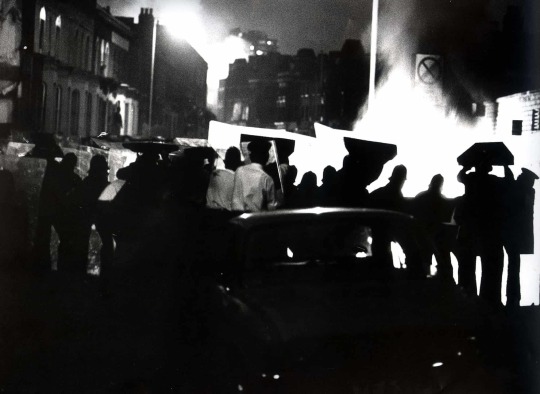
The Brixton riots, London, Tony McGrath, April 1981
#photography#vintage photography#vintage#tony mcgrath#1980s#1981#london#england#uk#brixton riots#protest#black and white photography
19 notes
·
View notes
Text
youtube
and if you want to sing along -
"Ghost Town"
This town, is coming like a ghost town
All the clubs have been closed down
This place, is coming like a ghost town
Bands won't play no more
Too much fighting on the dance floor
Do you remember the good old days before the ghost town?
We danced and sang, and the music played in a de boomtown
This town, is coming like a ghost town
Why must the youth fight against themselves?
Government leaving the youth on the shelf
This place, is coming like a ghost town
No job to be found in this country
Can't go on no more
The people getting angry
This town, is coming like a ghost town
This town, is coming like a ghost town
This town, is coming like a ghost town
This town, is coming like a ghost town
This town, is coming like a ghost town
This town, is coming like a ghost town
This town, is coming like a ghost town
This town, is coming like a ghost town
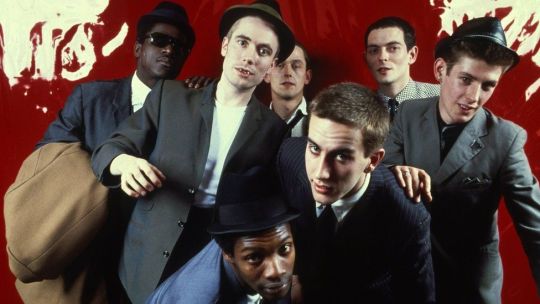
Riots have broken out around Britain.
Charles and Diana are about to marry.
And backstage at Top of The Pops, The Specials are falling apart.
In a few minutes they will perform their latest hit Ghost Town, which over the years, would come to be regarded as one of the greatest British singles of all time. It was a track which bottled the discord, racial tensions and societal breakdown happening in the UK that summer.
There had already been riots in Brixton that April, over the increased use of a new stop-and-search policy, the so-called sus law, which was named Operation Swamp. Police were said to have mounted a campaign of harassment against the black community in south London.
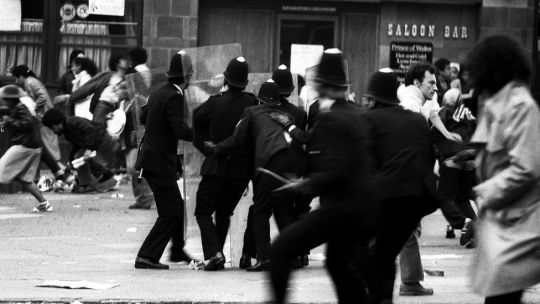
Brixton was the centre of clashes between members of the public and the police
Terry Hall is telling the band that he too has had enough. Worn down by touring, band infighting and struggling to deal with success, he wants out. It is too difficult to be singing about disharmony, while surrounded by it, both inside and outside The Specials.
"We knew it was going to end as we were recording it (Ghost Town)," Terry Hall told Front Row in 2019.
"It was bizarre. It took about eight months to record. I don't think there were more than two of us in the studio at any point. Those weren't good signs really. It finished up with me in a living room in Tottenham singing Ghost Town. It was all over the place. But it was a great way to bow out."
The song was written by the band's founding member Jerry Dammers, but it is also the track with which lead singer Terry Hall is most closely identified. Every TV and radio report about his death has centred on Ghost Town.
The single was simply one of the most timely releases in music history.
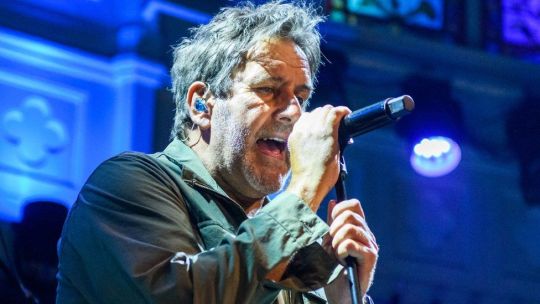
Terry Hall performing in Amsterdam earlier this year
"Talk about zeitgeist. That one song suddenly captured so much," remembered Specials fan and Bend It Like Beckham director Gurinder Chada in the 2021 BBC Documentary 2 Tone: The Sound of Coventry.
"If there is one song Margaret Thatcher wishes never got released, it's probably Ghost Town," she added.
On 7 July 1981, Radio One announced that Ghost Town had replaced Michael Jackson's One Day In Your Life at the top of the charts.
That same day, newspaper front pages were full of reports about the first ever use of CS gas grenades by the police on mainland Britain, as they struggled to contain the Toxteth Riots. These were sparked by tensions between police and the local community in Liverpool.
By the end of the week more than 20 towns and cities including London, Nottingham, Wolverhampton, Leeds and Luton had riots of their own. The Specials were providing the soundtrack.
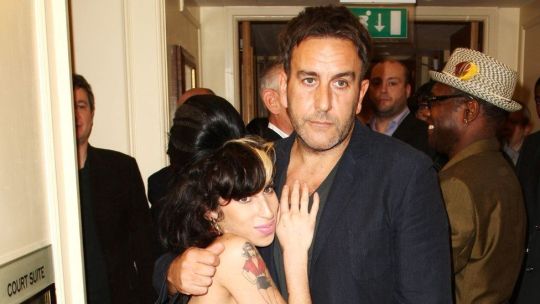
Amy Winehouse and Terry Hall both attended the Q Awards in 2009
In 2 Tone: The Sound of Coventry, Dammers explained how the creation of the song started with him sitting at his home organ, trying different diminished chords and working out how wailing could substitute a chorus.
"I think I wrote the music first. I was working on that for ages. The lyrics I wrote on tour just seeing what was going down around the country. It was about the recession and three million people on the dole. It's about the police harassment and unemployment. It was like a perfect storm really."
For years there has been debate over whether or not Ghost Town is specifically about their hometown of Coventry. The decline of the car industry had turned a thriving post-war economy into a concrete jungle.

Shakin' Stevens' Green Door shot up the UK singles chart
Neville Staple from The Specials has stated he believes the song should be taken more generally: "In Coventry and all over England it painted the same picture. This town is coming like a ghost town."
Terry Hall's own understanding of Ghost Town changed over the last 40 years. In 1981, when speaking to the New York Times, he insisted: "We were talking about riots in Bristol and Brixton. The fact that it became popular when it did was just a weird coincidence."
But speaking on BBC Radio Five Live in 2019, he told Nihal Arthanayake: "We made a record about how we saw the north of Britain. People think it was about Coventry. It wasn't. It was about Glasgow and Liverpool and Newcastle. It was about the north."
Ghost Town has certainly had an after-life.
When Amy Winehouse joined The Specials on stage at the V Festival in 2009, it was Ghost Town that she wanted to sing.
In Father Ted, when the priests organised a disco and the DJ, Father "Spin Master" O'Dwyer only has one record that everyone has to dance to all night, the 7 inch on repeat is Ghost Town.
West End Girls
On Desert Island Discs, it's a recent favourite, having been picked four times in the last three years: by the charity worker Claire Horton, the Director of Tate Maria Balshaw, the foreign affairs specialist Fiona Hill and the actor Rupert Everett, who called it "one of the great songs of the era".
And in 2020, The Guardian named it the second best number one single in the UK of all time, behind West End Girls by Pet Shop Boys, a song released four year later and not entirely dissimilar with the sense of urban decay which it creates.
Ghost Town is now considered to be an all-time classic, but its reign over the summer of 1981 came to an ignominious end. The day before 28 million people watched the wedding of the future King to Lady Diana Spencer, The Specials were dethroned.
The lunchtime unveiling of the charts revealed that rising 22 places to number one was none other than Shakin' Stevens with Green Door.
The band's era as chart-dominating stars had well and truly been slammed shut by Shaky. Within months, Hall had formed Fun Boy Three and The Specials in their original incarnation were over.
More than 40 years on Ghost Town stands as their defining work - the perfect coming together of pop and politics at exactly the right moment in history. It was that rarest of things, a song dealing with subjects found in The Economist while the band were on the cover of Smash Hits. Special indeed.
#Youtube#Ghost Town The Specials#SKA#Ghost Town#1981#UK#brixton riots#terry hall rip#Terry Hall#the specials ghost town lyrics#the special ghost town video
5 notes
·
View notes
Text
thing is after all of this we are still going to be gaslit when we say the UK is not and never has been a place that "isn't that bad" when it comes to racism
91 notes
·
View notes
Photo
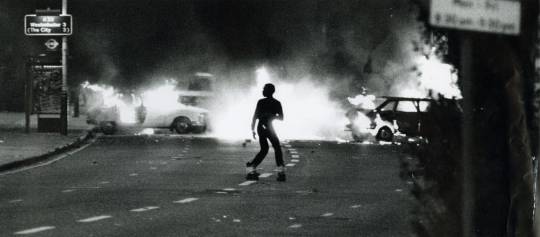
A roller-skater on the streets during the Brixton riots, September 1985
(Photo by Richard Mildenhall)
67 notes
·
View notes
Text
one of the things i find most interesting about the protests in france at the moment is this idea that the british would supposedly never do such a thing, because it makes me think about how different this country might be if we taught history properly.
by which i mean instead of just teaching kids about kings and queens and world war two, we taught them about chartists and suffragettes (and not just the polite, middle-class suffragettes), the peterloo massacre, the poll tax riots, the peasants' revolt, the general strikes of 1842 and 1926, the bristol bus boycott, the brixton uprising... i could go on but you get the picture.
596 notes
·
View notes
Text
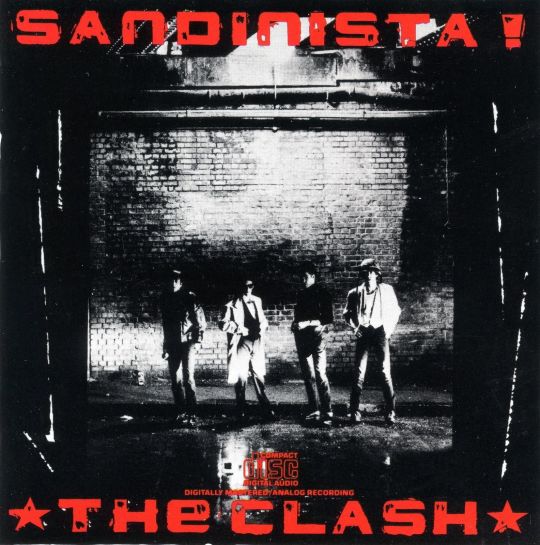
Storia di Musica #335 - The Clash, Sandinista!, 1980
Il punto esclamativo finale di questa piccola carrellata tra i dischi che lo hanno nel titolo arriva ad uno dei più famosi dischi degli anni ’80. Protagonista una band che nasce dal calderone del punk britannico della seconda metà degli anni ’70, ma che grazie ad un percorso per molti versi unico e virtuoso, è arrivata ad essere, giustamente, considerata come una delle più importanti rock band d tutti i tempi. Joe Strummer è figlio di un alto funzionario del Ministero degli Esteri Britannico, tanto che nasce in Turchia nel 1952. Quando ha 20 anni, fonda un gruppo, i 101’ers con Clive Tiperlee e Richard Dudanski. Suonano con discreto successo nei pub londinesi e registrano persino qualche canzone. Nel loro giro c’era un altro gruppo, I London SS, che erano noti poiché non suonavano quasi mai con la stessa formazione, in una sorta di gruppo aperto: tra coloro che più spesso ne facevano parte c’erano Mick Jones, Paul Simonon, Tory Crimes e Nicky “Topper” Headon. I primi tre si uniscono a Strummer e per qualche mese al chitarrista Keith Levine (che suonerà pochi anno dopo nei PIL di Johnny Rotten) e fondano un proprio gruppo, che prima si chiama Heartdrops, e poi The Clash. La prima, storica, esibizione è allo Screen On The Green di Islington, il 26 Agosto 1976. Inizia qui la loro storia: agli esordi sono una delle punte di diamante del punk di quegli anni, espressione più matura e politicamente sensibile del periodo storico economico di quei tempi. Ne è esempio il primo grande successo, White Riot, uscito nel Marzo 1977, ispirato agli scontri tra polizia e giovani neri al carnevale di Notting Hill nel 1976. Sono il punto di incontro della visione politica più matura e curiosa, lontano dall’anarchismo furbetto dei Sex Pistols o dall’apatia politica disinteressata dei Damned. Il loro esordio discografico è fragoroso: The Clash esce nell’anno Uno del Punk Britannico, il 1977, e piazza canzoni mito come I Fought The Law e (White Man) In Hammersmith Palais, unendo i ruvidi stilemi del punk a ritmi giamaicani del dub e del reggae. Il successo li carica, e il successo lavoro è leggenda: London Calling (1979) è il primo disco in studio cui Topper Headon prende posto dietro i piatti della batteria (dopo aver suonato già nel tour post primo disco), ma soprattutto è il racconto del rapporto odio-amore con gli Stati Uniti, fonte delle musiche vitali per loro stessi ma anche dell’ipocrisia, dei complotti. È un doppio disco che mostra la personale e infinita voglia di contaminare la musica di suoni e colori differenti: album pietra miliare per le musiche (l’incandescente title track), i temi (la violenza urbana di Guns Of Brixton, il terrorismo basco di Spanish Bombs), la copertina (che riprende la grafica dei primi dischi di Elvis con la foto di Simenon che distrugge il basso sul palco).
L’idea successiva, dopo un tour che li portò in mezzo mondo a suonare e una ormai consolidata fama di band impegnata, era piuttosto bizzarra: dopo aver imposto alla CBS il prezzo politico per London Calling di disco singolo pur essendo doppio, la band progettò la pubblicazione di 12 singolo uno per mese. Negata l’idea, ottenne di poter registrare per una settimana i mitici Electric Ladyland Studios di New York. Registrano di tutto, e tornano con una montagna di materiale a Londra. Inclusi vari remix dub di idee e canzoni. Mettono un po’ a posto tutto, e decidono di pubblicare tutto quello che avevano registrato, 36 canzoni, un triplo disco. La CBS non vorrebbe pubblicarlo, poi si accorda con la band: se volete anche stavolta il prezzo “politico imposto” dovete rinunciare ai diritti per le prime 200 mila copie. La band accettò.
Sandinista! è un omaggio al Fronte Sandinista di Liberazione Nazionale, un movimento rivoluzionario e partito politico nicaraguense protagonista nel 1979 del crollo del regime dittatoriale di Anastasio Somoza Debayle: deve il suo nome all’ispirarsi alle teorie di Augusto César Sandino, rivoluzionario nicaraguense, nonché uno dei conduttori della resistenza rivoluzionaria alla presenza militare statunitense in Nicaragua tra il 1927 e il 1933. Tra l’altro leggenda vuole che Margareth Thatcher odiasse profondamente il termine e avesse avuto l’idea di proibirlo in Gran Bretagna. Il disco allarga a dismisura l’osservazione del mondo, proprio perché, e le interviste dopo la pubblicazione lo confermeranno, i concerti li avevano portati dove non erano mai stati, potendo così vedere quello che non avevano mai visto. La musica non è mai stata così piena di influenze, di idee, tanto che i fan della prima ora lo criticarono aspramente, accusandolo di aver perso tutta la spontanea violenza del punk. Ma a ben vedere, i nostri non hanno affatto perso lo sguardo critico e potente sulle cose, lo hanno solo voluto esprimere in modi diversi. Bastano i 6 monumentali, e storici, minuti di The Magnificent Seven per spiegare tutto: primo brano di rap bianco, Mick Jones a New York rimase ipnotizzato dai primi lavori della Sugarhill Gang e dei Grandmaster Flash & The Furious Five, è il viaggio nella testa di un operaio che si alza alle sette di mattina per andare al lavoro, che lavora per comprare regali alla sua fidanzata, ma che è anche un grande affondo alla realta del consumismo contemporaneo. Hitsville Uk è un brano che sa di gospel e di soul (il titolo è un omaggio alla Motown). C’è il Blues di Junco Partner e la sua versione dub in Version Pardner. Ivan Meets G.I. Joe è la cronaca surreale dell'incontro-scontro a ritmo di disco music tra un soldato americano e uno sovietico su una pista da ballo, in un tripudio di suoni da videogioco. The Call Up si apre con i cori dei Marines statunitensi, perché la chiamata del titolo è proprio un riferimento al servizio militare, dato che nel 1980 il Congresso ripristinò l'obbligo per gli uomini di età compresa tra 18 e 25 anni di registrarsi al Selective Service System. C’è persino un valzer, Rebel Waltz, Charlie Don't Surf è tratto da una celebre battuta del film Apocalypse Now, Police On My Back, divenuta famosissima, è una cover di un vecchio brano di Eddy Grant contro il regime dell'apartheid in Sudafrica. Il tutto con remix, versioni dub, riferimenti alle rivoluzioni in America Latina, perfino la voce di una bimba, Maria, figlia di Mick Gallagher che dà una bella mano a suonare nel disco, che canta in modo stentato alcune strofe di Guns of Brixton accompagnata al pianoforte dal padre.
Ridondante, eccessivo, imperfetto, eppure spargerà fertilità ovunque e per decenni. Ricordo un ultima curiosità: non si sa se per caso o perché i Clash lo imposero, ma il numero di catalogo del triplo era 'FSLN1', stesso acronimo di Frente Sandinista de Liberación Nacional. Un ultimo riferimento magico ad un disco leggendario.
24 notes
·
View notes
Text
quite contrary: mary macdonald + historical context, music
this is my Mary MacDonald playlist and I'd like to talk a little about my interpretation of her and her cultural/historical context! it might not align with fanon, ive no idea but idc frankly haha. I hope to have done my due diligence in terms of research (i'm an absolute research fiend) and in general this is a topic I'm personally highly interested in. because it's highly interesting and (ime) little-discussed. I'll be providing links for further reading. tagging @goldenromione bc she asked me to do this!
so in my fic Mary is a muggle-born girl from a British-Caribbean family in Croydon. Her family owns a Caribbean restaurant in Thornton Heath. She's rebellious and punky and gets a lot of this from her two older brothers, both Muggles; Toby, the eldest, is part of the Race Today Collective in Brixton, dedicated to the publication of a political magazine (Race Today) on race relations in the UK. The middle brother, Lewis (who has a fling with Sirius as a matter of interest lol) is a musician/DJ very active in the Ska Revival/Two-Tone scene of the late 70s-early 80s.
All this is very influential on Mary; she is very outspoken about muggle-born rights at school, and her music taste reflects her background. I do think she would like women-led punk especially x-ray spex, but also in terms of ska a group I think she'd have liked is the selecter, which features pauline black the coolest female vocalist i've ever seen in my entire life. just look at her:
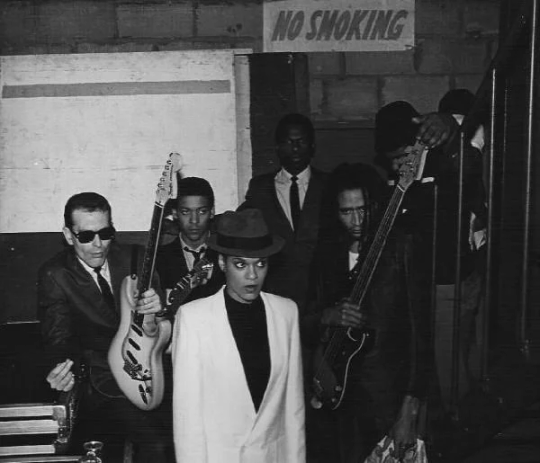
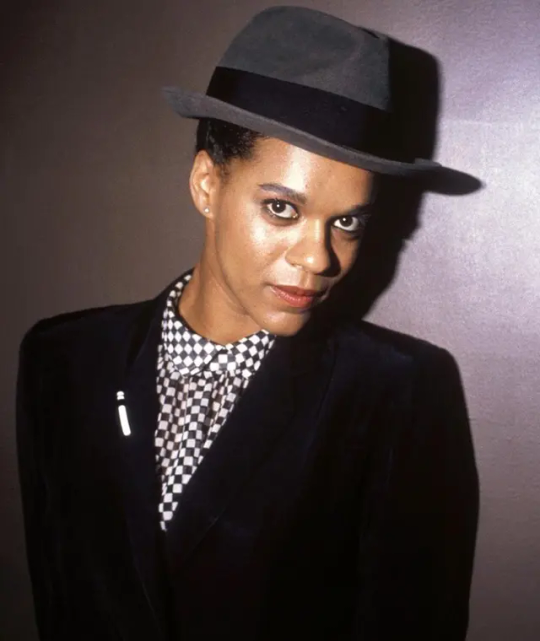
this will be explored in the upcoming 4th part of my fic, in which we see Sirius in his Brixton flat, and Mary and Lewis both spend a lot of time there. Specifically, he lives on Railton Road, which was a very important street in terms of both Black and LGBT history in Britain. It was the scene of the 1981 Brixton Riot and the location of many collectives at different points like the British Black Panthers, the 121 Centre (one of London’s longest running squats, also housed anarchist groups and other orgs), the aforementioned Race Today Collective, the Pink Fairies/South London Gay Community Centre, among others. It was also the home of many important Black British activists and historical figures like C.L.R. James, Darcus Howe and Leila Hassan. A few links:
A Radical History of 121 Railton Road
By the Waters of Babylon; The Battle of Railton Road; International Centres
Today in London gay history: the South London Gay Centre evicted, Brixton, 1976
Activist Streets (on history in Thornton Heath, linked above)
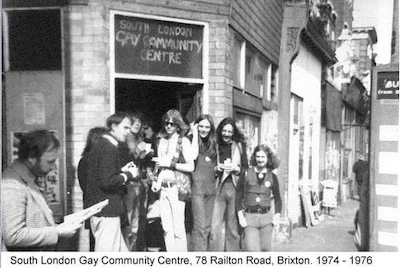

If anyone is interested in this topic I cannot, cannot recommend enough the miniseries Small Axe on Amazon, which covers a few different important moments in Black British history from the 60s to the 80s. It's so incredibly good and the soundtrack is SUPREME. Another good one to get a feel for the period is In the Long Run, created by Idris Elba and set in London in the 80s, loosely based on his own childhood.
Lastly, a few images of how I see Mary under the cut:
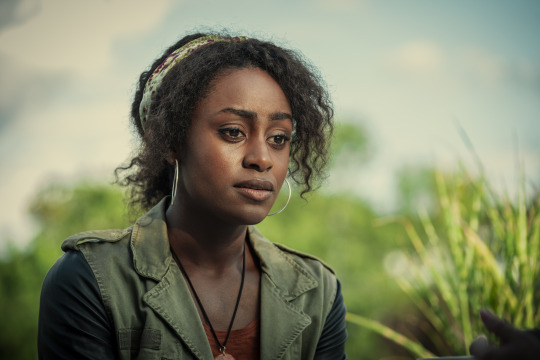



this is simona brown, my mary fancast, though the image I used for my playlist is of brenda sykes who I also think is an absolute Mary vibe.
#mary macdonald#mary#marauders era#mine#the darkest days#idk how to tag this tbh im just leaving it like that#the stranglehold that typeface has had on london signage lmao#i always thought it was futura but its johnston apparently#Spotify
36 notes
·
View notes
Photo

On this day, 11 April 1981, in London rumours about police brutality against a young Black man, against the background of the aggressive policing Operation Swamp 81, sparked days of rioting. Brixton’s youth, both Black and white, turned their anger on the police, leaving 280 injured in what would be one of the iconic urban riots of the Thatcher years. More information, sources and map: https://stories.workingclasshistory.com/article/8270/brixton-riots https://www.facebook.com/photo.php?fbid=606941718145714&set=a.602588028581083&type=3
161 notes
·
View notes
Text
Pisses me off when people mention police arresting anti-monarchy protesters and say "this is not Britain" or "this is not who we are."
Was it not Britain when police responded violently to a vigil for a woman murdered by one of their own? Was it not Britain when police acted violently against protesters in Bristol opposing the Police, Crime, Sentencing and Courts Act? Was it not Britain when they reacted violently to Black Lives Matter protests?
Was it not "who we are" when police murdered Chris Kaba, Dalian Atkinson, Sheku Bayoh, Mark Duggan, Ian Tomlinson, Jean Charles de Menezes, Joy Gardner, Cherry Groce or Blair Peach? Was it not "who we are" when their behaviour led to dozens of deaths at Hillsborough or when police attacked strikers at Orgreave, or when they provoked riots in Brixton and then further riots around the country with their heavy-handed behaviour towards black communities?
We don't need to reach for other countries to find examples of a repressive police state, we live in one.
49 notes
·
View notes
Text
The next night was the Poetry and Pride event, so I got queer-punked up: kohl-lined my eyes, put in one stud earring and one dangly earring, put some pins on my Joe Strummer/Know Your Rights bag; wore my W/IFS/Sticks & Stones tee that I cut the sleeves off last year, my cut-off denim short-shorts, my Doc Martens. Then I drove up to my old stomping grounds of Bay View. It was a night rife with nostalgia, but what night isn’t, am I right? Haha, but seriously though, this one was especially nostalgic. I mean, the drive up, taking the backroads to Milwaukee, past all the fields heavy with summer, listening to The Clash, it made me think of driving with A. on those same roads, listening to those same tunes, 20, 21, 22, 23, 24 years ago. For a split second, I thought if I looked over to the passenger seat, she’d be there, feet up on the dash, smoking a cigarette, singing along to “Guns of Brixton.” Of course she wasn’t, and of course that made me a little sad, but it was a happy sadness. And then Bay View, Bay View, the neighborhood I lived in for three years and spent so much time in both before and since. But I hadn’t spent any time in that neighborhood since August 2019, when I went to the Cactus Club to see what I didn’t know then would be my last World/Inferno show ever. It was good to be in Bay View; so much has changed but so much of it is still the same. And it was a proper Milwaukee summer night, the air thick with heat and everyone out and about.
I’d never been to Sugar Maple—the place where the event was—before. It’s a great bar, with a fantastic selection of whiskies and beers. I got a double of Buffalo Trace but the bartender poured more like a triple, and didn’t even charge me extra for it. Then I headed back to the event room, found a seat near my friend N.M., checked in with T. to let them know I had arrived. The other poets were fantastic. Some were new to me, some were people I’d seen at the Vista 59 poetry nights. But everyone was on that night, sharing their own words as well as others’. Someone told a story of the Black Nite Brawl, a riot at a gay bar in Milwaukee that happened eight years before Stonewall. Someone read some fragments of Sappho; someone read a Walt Whitman poem. And I was on that night, too, my spoken word mojo was definitely there, unlike my last reading back in May. (Didn’t hurt that this place actually had good lighting and a proper performance space.) I started with an excerpt from “forget the fuck away from me,” the part where I say fuck you / I’m Allen Ginsberg’s daughter, and then after that I mentioned that one of my favorite poems of Allen’s is his one about Walt Whitman, and I recited a bit of “A Supermarket in California:” Who killed the pork chops? What price bananas? Are you my angel? Then I read an excerpt from the gender-and-sexuality issue of Reckless Chants, a segment about being nonbinary but still having people gender me as Woman because I’m femme. I closed with one of my fanzine poems, “no man (born with a living soul),” and that felt like legit magic, like I cast a spell. I brought the house down with that one; I’m not kidding, people actually stood up to clap and cheer.
Then it was intermission, so I went outside and had a cigarette, and wandered down the block a bit, taking photos of interesting stickers, scoping the other people out and about, smelling weedsmoke from somewhere nearby. I remembered, again, that moments like that are when I feel the most like myself, the most free and content—when I’m alone, wandering a city, taking some pictures, taking in everything around me, maybe talking to some strangers, maybe just keeping to myself. I realized, also, that I was no longer afraid of running into S. and W. I spent a good five years—between the Great Friend Exodus of 2014 and the W/IFS show in August 2019—being a little freaked out every time I was in Bay View, that I might run into them (or other old friends from that time in my life). Not because I thought they’d do anything to me, necessarily, or even talk to me, just that it would be weird and sad. But I think that W/IFS show kinda got me past it. Because I was 100% certain they’d be there, and they weren’t, and then I had such a great time at the show that I realized even if they had been there, I would’ve been okay. Because I had other good friends there, some of them actual members of the band. And even though this time I was all alone…yeah, I wasn’t afraid. It’s been long enough, now, that the extreme psychic pain I was in for those five years has dulled to a slight pang. And anyway, I didn’t see them that night, either.
Then back inside, where I ordered a Sea Foam Sour beer, and sat back down in the event room. A gorgeous shorn-headed femme approached me, said they loved and could totally relate to the piece from my zine that I’d read. They were wearing a dress, red lipstick, and lots of jewelry, and said: “I’m genderfluid, too, but I often dress like this—because I like it. And yeah, people see my body in these clothes and see a Girl.” Then we discussed the whole ‘to cut my tits off or not to cut my tits off’ dilemma, and we both agreed it would be great if tits were just removable, like you could just take ‘em off and put ‘em back on as desired.
I sipped my beer, watched the musicians. They weren’t what I was in the mood for that night—I wanted something loud fast rules—but they were really good. Around 9:30, I slipped out and headed home.
The drive home was nostalgic, too. I blasted Idles, drove Highway 32 the whole way, that road I know so well. Drove through all the sleepy blinking-stoplight towns south of Milwaukee, then on into the wilds near the lake, where I could smell sweet grass and the musk of skunks.
[from a journal entry, 7/9/23]
#razorsadness#journal entry#2023#poetry and pride#milwaukee#fuck you i’m allen ginsberg’s daughter#queer shit#gender#good nights
2 notes
·
View notes
Text
Electric avenue was playing earlier and I need to find a third song about the Brixton riots because three is just such a nice round number
2 notes
·
View notes
Text
To mark the 50th anniversary of the group’s formation, the writings of the BBWG have been brought together for the first time and published as a book. Described as “unique and essential” by Booker-winning author Bernardine Evaristo, Speak Out! is made up of writing from the group’s newsletter. Also called Speak Out!, the newsletter “was a way to reach out to other women who may have had a similar experience” according to Lewis. It contained everything from reports on the work the group were doing and political explainers to reviews of plays, films and novels.
Fifty years ago, a group of women who were part of the British Black Panther movement were fed up with being ignored. In male-dominated discussions there was a distinct lack of interest in women’s issues, and hierarchical structures meant some members felt they did not have a voice.
“We had a women’s caucus,” but it “was not universally popular with the Panthers”, recalls retired academic Beverley Bryan. “Why are these women getting together?” some of the men would ask.
So Bryan and her friends founded the Brixton Black Women’s Group (BBWG), which set out to campaign and raise awareness of the issues affecting women of colour across the UK. For example, 1970s Britain saw the trial of the Mangrove Nine and dozens of women from Indian and Pakistani backgrounds subjected to virginity tests by immigration officials when entering the country according to Home Office documents, while the 80s witnessed the Brixton riots.
“Because of all that was happening at the time we sensed the urgency for a group like this,” says Nigerian-British writer Amina Mama, an early member of BBWG. “People were being attacked and locked up, amid a backdrop of the Brixton riot uprisings.” The level of violence the group saw spurred them into action: “Women pushing pushchairs [were] being dragged into the back of vans”, Mama remembers.
“We arrived in Brixton Black Women’s Group hungry for something, but it was also a place where we could come to know ourselves differently”, says writer and academic Gail Lewis, another early BBWG member.
Mama agrees – she joined the group having spent the previous four years in Scotland. “I had the same hunger to be among like-minded people. It was amazing finding sisters and having that sense of solidarity.”
To mark the 50th anniversary of the group’s formation, the writings of the BBWG have been brought together for the first time and published as a book. Described as “unique and essential” by Booker-winning author Bernardine Evaristo, Speak Out! is made up of writing from the group’s newsletter. Also called Speak Out!, the newsletter “was a way to reach out to other women who may have had a similar experience” according to Lewis. It contained everything from reports on the work the group were doing and political explainers to reviews of plays, films and novels.
Milo Miller, the collection’s editor, began gathering archive material in 2016, when they came across the group’s work as part of their PhD thesis. One unusual thing Miller discovered was that the articles were written collectively, with no singular bylines used. “The young ones cannot believe it. We had to think about every word and it was a collective,” says Lewis.
“I think Speak Out! is a good testament to the ideology of our movement but also to our practice – the very fact that we didn’t publish our names on the newsletter really showed how flat and equal and nonhierarchical we were as a group,” says Mama. “Having Speak Out! was a really important thing in terms of ideological corrective, as we were a group that regarded ourselves as part of a movement, so this was our tool for outreach and for mobilising other people. You can’t have a movement without a communication tool and this was ours”.
Although the BBWG was only active for 16 years, its legacy as both a community hub and political organisation inspired many other feminist and anti-racist groups in the years after. It was instrumental in establishing the Organisation of Women of African and Asian Descent, for example, which existed between 1978 and 1982, which was also the first national Black women’s organisation in the UK.
But despite its outward focus, the group was seen as first and foremost a community. “The group were incredibly supportive and helpful, and they really honed our abilities to argue, and to discuss what was important” says Sona Osman, a barrister who joined the group in her early 20s. Although modern activist groups are being organised, Osman doesn’t think that same sense of community evident in the 80s can be replicated.
“If a group like that still existed I would be there in a heartbeat.”
6 notes
·
View notes
Text
A (complete, possible or partial) fictionalization of selecting a Pet Shop Boys song for King Charles’ Coronation.
This is a very abridged, fictionalization…if you like it, please feel free to add to it…
—————————————————————————
King Charles: Okay, Pet Shop Boys, what do we have?
Staffer: Well, here is a list of their songs.
KC: Well, maybe a tad obvious, but “West End Girls?”
S: (display of physical pain on their face)
KC: What’s wrong?
S: Well, I am not sure that would be a great song to choose….for this occasion. It is sort of about everyday people being driven mad by the systems designed by and who benefit only the wealthy and powerful.
KC: I see…yes, that is not the tone that I want to set with my reign. If anyone asks though, we thought it was too eighties.
S: (doing their best to hold in their skepticism)....Sure.
KC: Ooooh….”Opportunities..
S: ….Finish the song title…
KC: …Let’s make lots of money”…sounds a bit money-grubbing…not the impression we want to set.
S: Definitely not.
KC: “Suburbia”…I like the suburbs…this could work.
S: Yeah, it…could have…but the song is partially about the Brixton riots in the 80s…it doesn’t speak very well of the suburbs…or the police.
KC: Understood, let’s keep going..
S: “It’s a Sin”
KC: Jesus Christ no!
S: Blasphemy
KC; What?
S: Nothing
KC: “What have I done to deserve this?”
S: You were born into a royal family.
KC: What?
S: The song title…it is a question.
KC: I understand that.
S: The question is “What have I done to deserve this?”
KC: Yes….O’ I get it. Next song then….”Go West.” That one is popular at football matches right.
S: It is but…
KC (sighing)...but what…
S: I think this song, if associated with your coronation, could trigger some feelings around colonization and considering how poorly your families recent goodwill trips have gone, that might not go well.
KC: Okay….
(an undefined but still long time later)
S: How about “All over the World”?
KC: What about your earlier concerns for the colonies?
S: Sort of an issue here too, but this may be the best song for your coronation from their catalog.
KC: Okay, then that is the one……I am starting to get the impression they are not fond of our family.
S: (trying to hold their tongue).
…
S: Oooh, found something.
KC: What is it?
S: What do you think about “Dreaming of the Queen?”
KC: ….you are fired.
5 notes
·
View notes
Text


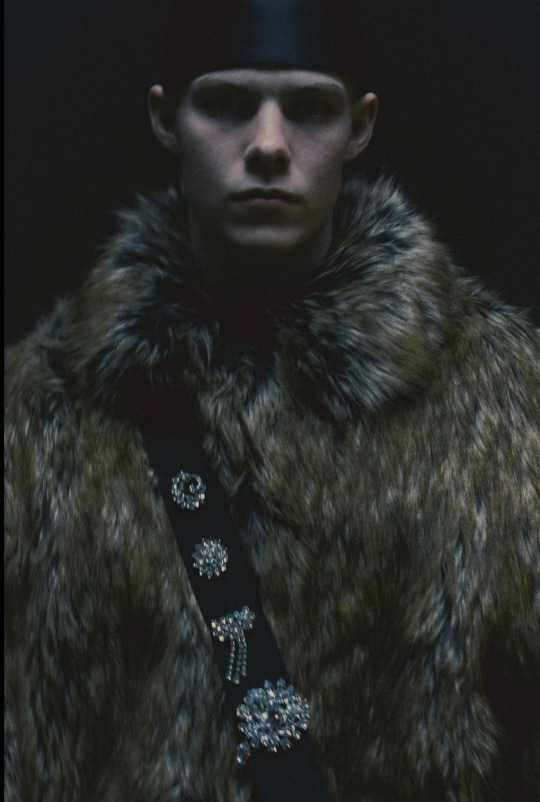


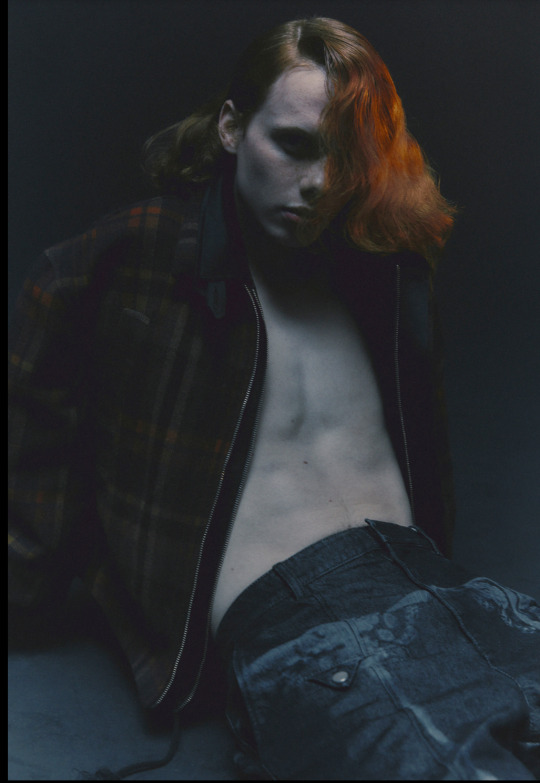
DENZIL PATRICK
Fall 2023 Menswear
Daniel Gayle, the designer behind the London menswear label Denzil Patrick, is pretty nifty when it comes to naming his collections. This spring was dubbed London Belongs To Me, while for fall he came up with the equally evocative All Dressed Up and Somewhere To Go. That sense of evocation is two fold. For one, with All Dressed Up...Gayle has tapped into the coming season's new mood for menswear: a bit more glam, a bit more peacocking, and a whole lot more newness when it comes to tailoring. And evocative because Gayle is canny in a whole other way too. There's a rich sense of narrative going on here, personal and reflective, emotive and joyful. And that could be exactly the right approach to be taking now as a tiny indie in a world of behemoth megabrands: To make your label meaningful, tell your own story, not anyone else's.
In Gayle's case, that always starts with family, with all the love, connection, and complication that entails. With All Dressed Up... the starting point was an image of his mother taken during the very early '80s in the multicultural south London neighborhood of Brixton. And, another earlier family snapshot from the '40s, of his grandmother glammed up to go shopping in London's West End, a photograph brimming with the palpable and recognizable thrill of having made the effort and having made the effort and
turned yourself out in style in a
sartorial rebuke to whatever else is going on in your life. "I'd spent so much time talking about my grandfathers, Denzil and Patrick [hence the label name]," he said, laughing, “I wanted to give a nod to the powerful women in my life."
That led him to think about the family home in Brixton; to the very fabric (literally and metaphorically) of the domestic environment-the carpets and net drapes—that have become the prints for red or silver gray plush velvet jackets and silken shirts, or lace wrap dresses which can be layered with sharp jackets and pants with a snug-fit higher waistline. The tailoring was inspired by his snappily suited young Mod uncles, while his fake furs (made from deadstock fluffy stuff) came from that image of granny.
In effect, there's a whole generational and gender interplay going on here. That's powering a lot of fashion these days, but Gayle's is specifically familial. You don't need to know anything about the Gayle clan to feel the emotional resonance in these clothes, but it's there, and it makes his work all the more compelling for it. Make fashion, but mak it feel, is the message here-like the familiar comfort of Gayle's cozy Aran cardigans, which have been recycled from vintage ones, then re-dyed in the most gorgeous shades of scarlet and emerald. It's creative ambition informed by emotion.
Elsewhere, Gayle delved again, as he has done in the past, into his early dance training, giving a nod to the the brilliant, Puck- ish Scottish choreographer Michael Clark, who danced with Leigh Bowery and in BodyMap (the bodysuit the cult '80s London duo designed for Clark featured cut-outs, memorably including one exposing his ass). That led Gayle to explore how fit and freedom of movement can work together-that very au courant wider, sloping shoulder, or the narrow, warm- up pant leg, or the deep curving armholes on a pale mauve duchesse satin tee that's been spangled with jewels. That's not the only decorative flourish. Equally personal, Gayle's partner, the artist James Bosley, sketched a sassy character called Lydia, all Jessica Rabbit curves and Riot Grrrl attitude, who appears on the likes of a sweater with an exposed back. So, yes, dressed up, to be sure, all and with enough thought and imagination to suggest these clothes are definitely going somewhere.
3 notes
·
View notes
Text
The Make Three- You, Me & the Make Three (Mint 400 Records)

If you need a little beef added to your diet then try The Make Three. This NJ band features the talents of Jerry Lardieri (from Brixton Riot, etc) on vocals/guitar as well as a few gents from The Anderson Council (Peter Horvath on bass/vocals and Chris Ryan on drums) and this is some terrific, chunky, rockin’ power pop.
Right from song number one, “Against the Tide” these three are locked in, slotted and make some real righteous noise.
In the guitar leads (like the one on “Under My Skin”) you’ll hear echoes of J. Mascis while on other cuts a nice mix of Husker Du meets Superchunk will enter your mind. Speaking of mind, “Pay No Mind” is slightly more subdued, but still packs a strong wallop and don’t miss the punchier “Emily Strange,” another fab cut on here (as is the slashing “Local Scene”).
All three of these guys have been at this indie rock game for quite some time and know their stuff. I’m glad they decided to get into a room and see if things would work (which they surely do). Keep on keepin’ on, gentlemen
www.themakethree.bandcamp.com

3 notes
·
View notes
